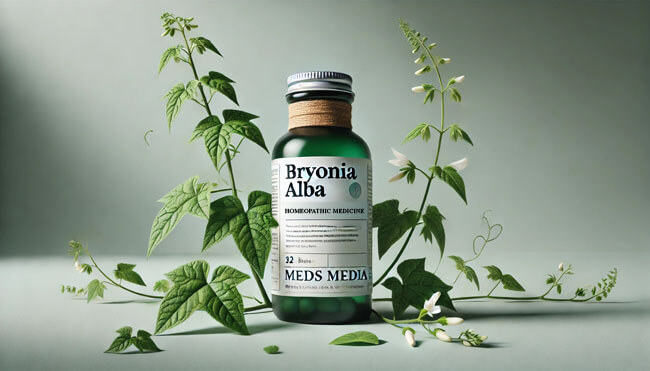Bryonia alba, a widely utilized homeopathic remedy, has gained attention for its potential to address specific diabetic symptoms, especially those related to dryness, emaciation, and hepatic disorders. This guide explores the medicinal properties of Bryonia alba in the context of diabetes, detailing its origin, main indications, symptoms, and practical applications.
Understanding Bryonia alba
Derived from:
Bryonia alba, commonly known as White Bryony, belongs to the Cucurbitaceae family. It is a perennial climbing plant native to Europe and parts of Asia. The remedy is prepared from the roots of the plant and undergoes homeopathic potentization to create a safe and effective medicinal formulation.
Kingdom: Plantae
Source: Root extract of Bryonia alba
Main Indication: Diabetes Mellitus
Bryonia alba is primarily indicated for diabetes cases exhibiting dryness, hepatic dysfunction, and symptoms of dehydration. It is noted for alleviating discomfort caused by excessive thirst, poor glycemic control, and emaciation. Although not a cure for diabetes, it provides symptomatic relief, particularly in Type 2 diabetes, and supports better overall management of the condition.
Main Symptoms Treated by Bryonia alba
- Dryness:
- Severe dryness of lips and mucous membranes, often one of the earliest signs in diabetic patients.
- Dry, parched mouth and throat with an unquenchable thirst for large quantities of water at infrequent intervals.
- Hepatic Dysfunction:
- Bitter taste in the mouth, often associated with underlying liver issues common in diabetic patients.
- Poor digestion and constipation linked to sluggish hepatic function.
- Mental and Emotional State:
- Moroseness, lethargy, and a dispirited attitude that coincides with chronic illness.
- Anxiety or irritability, particularly when disturbed or forced to move.
- Emaciation:
- Weight loss and significant strength reduction due to an inability to metabolize glucose effectively.
- General weakness and a tendency toward fatigue even after minimal exertion.
- Thirst and Dehydration:
- A persistent, overpowering thirst that does not align with the volume of fluids consumed.
- Sensation of internal dryness despite water intake.
- Acute Pain Symptoms:
- Aching or discomfort in the limbs, which worsens with movement, indicative of systemic inflammation often seen in diabetic neuropathy.
Applications and Uses of Bryonia alba
Uses:
Bryonia alba is beneficial for individuals with:
- Type 2 diabetes showing symptoms of dryness and hepatic dysfunction.
- Digestive disturbances such as constipation or slow digestion.
- Diabetic patients with anxiety, irritability, or a melancholic disposition.
Conditions It Best Treats:
Bryonia alba is most suitable for chronic conditions with acute exacerbations, such as:
- Chronic diabetes mellitus.
- Episodes of acute dehydration or hypovolemia.
- Diabetes-induced liver dysfunction or biliary issues.
Suitability in Diabetes:
Type 1 or Type 2 Diabetes?
Bryonia alba is better suited for Type 2 diabetes, especially in cases characterized by hepatic involvement, dehydration, and gastrointestinal symptoms. It may offer supportive relief for Type 1 diabetic patients with similar symptoms but is not a primary treatment modality.
Acute, Severe, or Chronic?
Bryonia alba is most effective for chronic cases of diabetes but can provide relief during acute exacerbations, such as a sudden onset of severe thirst or dryness.
FAQs about Bryonia alba and Diabetes
1. Can Bryonia alba cure diabetes?
No, Bryonia alba cannot cure diabetes. It is a symptomatic remedy used to manage specific signs and discomforts associated with the disease.
2. How is Bryonia alba administered in homeopathy?
Bryonia alba is typically administered in potentized doses, with the dilution and frequency determined by a qualified homeopathic practitioner.
3. What symptoms indicate the use of Bryonia alba for diabetes?
Key indicators include severe dryness of the lips and mouth, a persistent bitter taste, significant thirst, constipation, and mental states such as irritability or lethargy.
4. Is Bryonia alba safe for long-term use?
When prescribed by a professional, Bryonia alba is safe. Its potentized form ensures minimal risk of toxicity.
5. Can Bryonia alba replace conventional diabetes treatments?
No. Bryonia alba is a complementary treatment and should not replace insulin or other prescribed medications for diabetes.
Key Insights and Improvements in Managing Diabetes with Bryonia alba
Bryonia alba exemplifies how homeopathy can target specific symptoms in diabetes management. Here are some enhanced understandings:
- Holistic Benefits: Beyond diabetes, it helps with systemic inflammation, aiding those with diabetic complications like neuropathy.
- Mental and Emotional Relief: The remedy aligns physical symptoms with emotional well-being, addressing the mental toll diabetes often takes on patients.
- Hepatic and Digestive Focus: By supporting liver function and alleviating constipation, it addresses common but overlooked diabetic symptoms.
Select Your Homeopathic Medicine Dose and Potency
Potency Selection Guide
Relationship of Remedies
Similar Posts

Remedy for Diabetes rheumatic pains in homeopathy

Uranium Nitricum (Uran-n): A Bird’s Eye View of the Homeopathic Diabetes Remedy

Mouth Symptoms in Diabetes:Homeopathic Medicines and Their Indications

Face Symptoms in Diabetes:Homeopathic Medicines and Their Indications

Hearing Symptoms in Diabetes:Homeopathic Medicines and Their Indications

VISION: Diabetes Symptoms and Homeopathic Medicines

Eyes-related symptoms in diabetes: Homeopathic Medicines and Their Indications

Head-related symptoms in diabetes: Homeopathic Medicines and Their Indications

Vertigo Symptoms in Diabetes: Insights for Homeopathic Treatment

Mind Symptoms in Diabetes: Rubric, and Homeopathic Remedies

Repertorial Symptoms Related to Diabetes Mellitus and Its Complications

Homeopathic Medicines and Concomitants for Managing Diabetes

Diabetes: Causes, Miasms, and Homeopathic Medicines

Diabetes and Homeopathy: Effective Remedies According to Boericke’s Materia Medica

